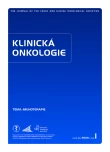-
Medical journals
- Career
Neurotoxicity and Immunotherapy
Authors: J. Kopecký
Authors‘ workplace: Klinika onkologie a radioterapie FN Hradec Králové
Published in: Klin Onkol 2020; 33(1): 11-14
Category: Review
doi: https://doi.org/10.14735/amko202011Overview
Background: Great progress has recently been made in immunotherapy of solid carcinomas. The advent of immunotherapy with checkpoint inhibitors has brought not only a completely different mechanism of action but also different types of adverse reactions. These adverse reactions are similar to those of autoimmune diseases and are referred to as immune-related adverse events. Most adverse reactions are due to lower grade toxic effects. Neurotoxicity is a less frequent. On the other hand, with the spread of immunotherapy, it can be assumed that adverse events with a lower incidence may occur in a relatively higher frequency due to borader usage of immunotherapeutics and thus, physicians outside of cancer centres may be presented with these events. The main therapeutic intervention is immunosuppressive therapy with corticoids. However, in some cases, or in case of delayed intervention, they may be fatal.
Purpose: Therefore, it is of great importance to increase the physician’s and patient’s knowledge of the possible complications of this promising treatment modality. It is essential to apply proper management and help patients engage positively to prevent these situations occurring.
This study was supported by the following research programme of Ministry of Health of the Czech Republic – RVO (FNHK, 00179906).
The author declares he has no potential conflicts of interest concerning drugs, products, or services used in the study.
The Editorial Board declares that the manuscript met the ICMJE recommendation for biomedical papers.
Keywords:
nivolumab – ipilimumab – imunotherapy – neurotoxicity
Sources
1. Kopecky J, Kubecek O, Geryk T et al. Nivolumab induced encephalopathy in a man with metastatic renal cell cancer: a case report. J Med Case Rep 2018; 12 (1): 262. doi: 10.1186/s13256-018-1786-9.
2. Cuzzubbo S, Javeri F, Tissier M et al. Neurological adverse events associated with immune checkpoint inhibitors: review of the literature. Eur J Cancer 2017; 73 : 1–8. doi: 10.1016/j.ejca.2016.12.001.
3. Wang DY, Salem JE, Cohen JV et al. Fatal toxic effects associated with immune checkpoint inhibitors: a systematic review and meta-analysis. JAMA Oncol 2018; 4 (12): 1721–1728. doi: 10.1001/jamaoncol.2018.3923.
4. Gu Y, Menzies AM, Long GV et al. Immune mediated neuropathy following checkpoint immunotherapy. J Clin Neurosci 2017; 45 : 14–17. doi: 10.1016/j.jocn.2017.07.014.
5. Supakornnumporn S, Katirji B. Guillain-Barre syndrome triggered by immune checkpoint inhibitors: a case report and literature review. J Clin Neuromuscul Dis 2017; 19 (2): 80–83. doi: 10.1097/CND.0000000000000193.
6. Makarious D, Horwood K, Coward JI. Myasthenia gravis: an emerging toxicity of immune checkpoint inhibitors. Eur J Cancer 2017; 82 : 128–136. doi: 10.1016/ j.ejca.2017.05.041.
7. Larkin J, Chmielowski B, Lao CD et al. Neurologic serious adverse events associated with nivolumab plus ipilimumab or nivolumab alone in advanced melanoma, including a case series of encephalitis. Oncologist 2017; 22 (6): 709–718. doi: 10.1634/theoncologist.2016-0487.
8. Touat M, Talmasov D, Ricard D et al. Neurological toxicities associated with immune-checkpoint inhibitors. Curr Opin Neurol 2017; 30 (6): 659–668. doi: 10.1097/WCO.0000000000000503.
9. Haanen JB, Carbonnel F, Robert C et al. Management of toxicities from immunotherapy: ESMO Clinical Practice Guidelines for diagnosis, treatment and follow-up. Ann Oncol 2018; 29 (Suppl 4): 264–266. doi: 10.1093/annonc/mdy162.
10. Lakomy R, Poprach A. Side effects of modern immunotherapy and how to solve them in the clinics. Klin Onkol 2015; 28 (Suppl 4): 4S103–4S114. doi: 10.14735/amko20154S103.
11. Kyllarová A, Kubeček O, Trojanová P et al. Toxicita imunoterapie. Onkoklogie 2017; 11 (2): 83–87.
12. Centanni M, Moes DJ, Trocóniz IF et al. Clinical pharmacokinetics and pharmacodynamics of immune checkpoint inhibitors. Clin Pharmacokinet 2019; 58 (7): 835–857. doi: 10.1007/s40262-019-00748-2.
Labels
Paediatric clinical oncology Surgery Clinical oncology
Article was published inClinical Oncology

2020 Issue 1-
All articles in this issue
- Side Effects and Efficacy of Immunotherapy
- Neurotoxicity and Immunotherapy
- Management of Immune-Related Endocrinopathies in Anticancer Treatment with Checkpoint Inhibitors
- Immunotherapy-Associated Myocarditis
- Gastrointestinal Toxicity of Immunotherapy
- Renal Toxicity of Cancer Immunother apy
- The Importance of Cancer-Associated Fibroblasts in the Pathogenesis of Head and Neck Cancers
- Long-Term Clinical Results of IGRT in Prostate Cancer Treatment
- Programmed Death-Ligand 1 Expression in Non-Small Cell Lung Carcinoma Biopsies and Its Association with Tumor Infi ltrat ing Lymphocytes and the Degree of Desmoplasia
- Novel Aspects of Genetics, Molecular Biology and Clinical Oncology of Sarcomas
- Editorial
- Aktuality z odborného tisku
- The Important Role of STAT3 in Chronic Lymphocytic Leukaemia Biology
- Clinical Oncology
- Journal archive
- Current issue
- Online only
- About the journal
Most read in this issue- Side Effects and Efficacy of Immunotherapy
- Neurotoxicity and Immunotherapy
- The Important Role of STAT3 in Chronic Lymphocytic Leukaemia Biology
- Immunotherapy-Associated Myocarditis
Login#ADS_BOTTOM_SCRIPTS#Forgotten passwordEnter the email address that you registered with. We will send you instructions on how to set a new password.
- Career

